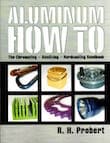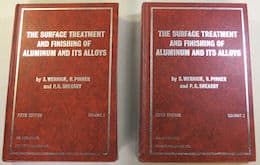
-----
Power supply for aluminum anodizing at home -- welder, PC supply?
Q. I'm a small home machine shop that does some anodizing. My problem is that I would like to do bigger parts thus forcing me to need a bigger power supply. I've heard of people using welders. But from what I've read you need about 15 volts and capable of 15 amps per square foot. Welders are about 32 volts. How important is the amount of voltage? Can anybody shed some light on this or maybe a different power supply
Tony Dickson1996

Aluminum How-To
"Chromating - Anodizing - Hardcoating"
by Robert Probert
Also available in Spanish
You'll love this book. Finishing.com has sold almost a thousand copies without a single return request :-)
A. I don't know how much you need, but I too plate objects in a home shop and found power to be my most difficult hurdle.
Turns out, that power supplies up to 200 amps are cheap and plentiful in the electronics surplus market. My guess is that these are computer power supplies from mainframes or something.
Richard Rittenburg1996
A. Computer power supplies are fixed voltage and are 200 watts, not amps. There are some 200 amp power supplies on the market that are military or government surplus. Unfortunately, most of these are 5.2 volts with a very narrow adjustment band. I have gone out of the plating business and can give you a good price on one if you still need one. 50 amp to 300 amp. These are fairly heavy. One person can lift (strain) the small ones, but not the big ones.
Welders tend to be fixed voltage and you need to be able to ramp up the voltage. At 32 volts you will need excellent agitation and cooling. Welders can be modified, but it takes more knowledge than I have.
James Watts- Navarre, Florida
1996
Power supply for aluminum anodizing at home
RFQ: I currently have a anodizing set up at home, which is working very well on small parts.I am getting many requests for anodizing larger Items. My current power supply is 2 12-volt batteries connected in series, hooked up to a 30 amp battery charger ⇦ on eBay or Amazon [affil link] , running through 5 1-ohm variable resistors. My problem is, as I pump up the amps my voltage drops right off. Does anyone know where I can get a power supply that will run off 240 volts single phase and give me 12-18 volts DC and be capable of pumping out at least 50 amps
Thank you for any information
Kind Regards
Steve Power- Nelson New Zealand
2001
Ed. note: This RFQ is outdated, but technical replies are welcome, and readers are encouraged to post their own RFQs. But no public commercial suggestions please ( huh? why?).
2001
A. This is what people would call a single-phase bench rectifier. Click on the "Equipment" button below and you'll get a good list of suppliers with full contact information.
If price is an important criterion, you may find that a used high-quality industrial bench rectifier is a better investment than a new "toy rectifier".

Ted Mooney, P.E.
Striving to live Aloha
finishing.com - Pine Beach, New Jersey
Ted is available for instant help
or longer-term assistance.
A. Steve,
There are several bench top units that will work for you used in Brush Plating applications meeting the requirements of government and corporate agencies.
David Crocker- Valencia, California USA
2001
Need power supply for anodizing in home workshop
Q. Can you recommend sources for power supplies. What qualities should one be looking for. I'm starting to setup a small home setup, and don't want to spend money on the wrong equipment.
Ron Watkins- Mesa, Arizona, USA
2003
PC power supply for anodizing
Q. Hi.
I am just wondering. Will you be able to use a PC power supply to do anodizing?
I watched the specs on a 450W power supply and it said that it gives 12v 25A.
Thanks.
- Wellington, New Zealand
2007
A. I doubt that it would work since you must apply very low voltage at first and slowly ramp up. Plus, 12v is not enough for most alloys.

Ted Mooney, P.E.
Striving to live Aloha
finishing.com - Pine Beach, New Jersey
Ted is available for instant help
or longer-term assistance.
2007
Multiple threads merged: please forgive chronology errors and repetition 🙂
Can I use a PC power supply for anodizing?
Q. I am a total noob to anodizing, and I was wondering if it is possible to use a PC power supply to run a VERY small anodizing line (it would only be used for small paintball gun parts). If anyone can help me I would be very thankful!
Ted Buchanhobbyist - Trenton, Michigan, US
November 18, 2008
Treatment &
Finishing of
Aluminium and
Its Alloys"
by Wernick, Pinner
& Sheasby

on eBay or Amazon
or AbeBooks
(affil link)
A. Hi, Ted. You need to be able to reach at least 18 volts (and that's too low for some alloys, 24 volts would be better). You need to be able to supply 15-20 amps per square foot. And you need to be able to start the voltage at zero and dial it up as the anodizing progresses. If you can do that without electrocution risk, the PC power supply could work for tiny parts. Good luck.
Regards,

Ted Mooney, P.E.
Striving to live Aloha
finishing.com - Pine Beach, New Jersey
Ted is available for instant help
or longer-term assistance.
A. My guess is the voltage is too low and the amperage is also too low for some units.
James Watts- Navarre, Florida
November 21, 2008
Can one use a battery charger as an anodizing power supply?
April 7, 2017Q. My notion is "no" but I'm going around with an artist fella who thinks that he can.
My notion is that there is going to be too much ripple in the output from that. One can buy power supplies for like fifty bucks from Radio Shack. Or build one. The thing is the voltage. I see 18 V regulators but then one would need a 120 V to 18 V transformer.

Dave Wichern
Consultant - The Bronx, New York
A. Hello Dave. If you search this site for "battery charger anodizing", and have lots of patience, you'll find some opinions. Here's a sampling: in letter 24856, James Watts says a manual battery charger can work after a fashion; in letter 32971 Jason Aube says he has anodized with a battery charger; in letter 19941 Matthew Stiltner says the reason the original poster is getting a pink coloration is the very thin coating he is getting with his battery charger; in letter 25820 Goran Budija says you can successfully anodize with a 12 V/5 A battery charger.
Regards,

Ted Mooney, P.E. RET
Striving to live Aloha
finishing.com - Pine Beach, New Jersey
Ted is available for instant help
or longer-term assistance.
July 2017
Q. I am beginning to dive deeper into anodizing at home. I will be using a constant current power supply and using the current density model of anodizing, I have the option of buying a 15 V - 40 A unit or a 30 V - 20 Amp power supply. Am I better equipped with the higher 40 A amperage unit or will the 15 V limit me?
Bryan Rohr- edmond, Oklahoma
June 19, 2017
A. Hi Bryan. Figure 12 ASF, and the 20 Amp unit will handle parts up to 1.5 sq. ft. or so. Robert Probert says you need 21-24 V to be able to take on all alloys (although there are probably a lot of parts you can do with 15 V).
Regards,

Ted Mooney, P.E. RET
Striving to live Aloha
finishing.com - Pine Beach, New Jersey
Ted is available for instant help
or longer-term assistance.
July 2017
Q. Looking for a DIY Build site from an authoritative source to build a constant current power supply. Does any recommend a site.
I've found Mr. Titanium's GREAT site and build pages but he's focused on titanium anodizing.
Any recommendations?
paramotor pilot - Waterford, Virginia USA
May 9, 2018
Ed. note: Topic 18282 also talks about D-I-Y anodizing power supplies, and topics 3191 and 32439 talk about rather similar homemade power supplies for electroplating.
Q, A, or Comment on THIS thread -or- Start a NEW Thread